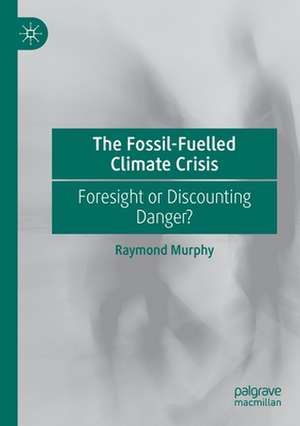The Fossil-Fuelled Climate Crisis: Foresight or Discounting Danger?
Autor Raymond Murphyen Limba Engleză Paperback – oct 2021
This book analyses the threat posed by the continued use of fossil fuels. By utilizing Elizabeth Shove’s social practices approach and Murphy’s own social closure framework, the book examines the accelerating treadmill of carbon-polluting practices. It incorporates externalities theory to investigate how the full cost of fossil fuels is paid by others rather than users, and to demonstrate that the environmental commons is a medium for conveying intergenerational monopolisation and exclusion in the Anthropocene. Murphy uncovers a pattern of opposition to change when exploiting valuable but dangerous resources. He argues that a new faith in mastering nature is emerging as a belief in just-in-time technological solutions to circumvent having to change fossil-fuelled practices.
The book then moves on to assess proposed solutions, including Beck’s staging of risk and his hypothesis that the anticipation of global catastrophe will incite emancipation. It proposes a novel approach to enhancing foresight and avoid incubating disaster. It will appeal to readers interested in an original social science analysis of this creeping crisis and its resolution.
| Toate formatele și edițiile | Preț | Express |
|---|---|---|
| Paperback (1) | 643.16 lei 6-8 săpt. | |
| Springer International Publishing – oct 2021 | 643.16 lei 6-8 săpt. | |
| Hardback (1) | 648.56 lei 6-8 săpt. | |
| Springer International Publishing – 30 sep 2020 | 648.56 lei 6-8 săpt. |
Preț: 643.16 lei
Preț vechi: 756.65 lei
-15% Nou
Puncte Express: 965
Preț estimativ în valută:
123.08€ • 133.65$ • 103.39£
123.08€ • 133.65$ • 103.39£
Carte tipărită la comandă
Livrare economică 23 aprilie-07 mai
Preluare comenzi: 021 569.72.76
Specificații
ISBN-13: 9783030533274
ISBN-10: 3030533271
Pagini: 397
Ilustrații: XV, 397 p. 7 illus., 6 illus. in color.
Dimensiuni: 148 x 210 mm
Greutate: 0.49 kg
Ediția:1st ed. 2021
Editura: Springer International Publishing
Colecția Palgrave Macmillan
Locul publicării:Cham, Switzerland
ISBN-10: 3030533271
Pagini: 397
Ilustrații: XV, 397 p. 7 illus., 6 illus. in color.
Dimensiuni: 148 x 210 mm
Greutate: 0.49 kg
Ediția:1st ed. 2021
Editura: Springer International Publishing
Colecția Palgrave Macmillan
Locul publicării:Cham, Switzerland
Cuprins
Chapter 1. Introduction.- Part I Analysing the Problem.- Chapter 2. Cooperation between Natural Science and Social Science.- Chapter 3. Social Closure in the Anthropocene: The Environment as a Medium for Monopolisation and Exclusion.- Chapter 4. Energy: Paying its Full Cost, Belatedly or Upon Use?.- Chapter 5. Stuck in Dangerous Carbon Polluting Practices?.- Chapter 6. A Pattern When Exploiting Valuable but Dangerous Resources.- Part II: Assessing Solutions.- Chapter 7. Risk and Safety; Real and Staged.- Chapter 8. Are Safe Social Practices on the Horizon?.- Chapter 9. Faith 2.0 in the Mastery of Nature.- Chapter 10. Technological Solutions and Social-technological Solutions.- Chapter 11. Foresight or Discounting Danger?.
Notă biografică
Raymond Murphy is Emeritus Professor of Sociology at the University of Ottawa, Canada and Past-president of the Environment and Society Research Committee, International Sociological Association. He has authored multiple books including Social Closure (1988) and Leadership in Disaster (2009).
Textul de pe ultima copertă
“A major innovation for the subfields of environmental sociology and ecological social theory. Building on the Weberian theoretical framework of social closure, coupled with a social practices approach, Murphy presents the climate crisis in a new, and dare I say even hopeful, light.”
- Michael S. Carolan, PhD, College of Liberal Arts, Professor, Colorado State University, USA
“This is the long-awaited first book on the climate crisis to use Murphy's social closure framework. He contributes a brilliant and candid sociological analysis of structures, impacts, and solutions of climate change. Murphy stresses the importance of visibility and concreteness to raise our awareness in order to efficiently mitigate the problem.”
- Koichi Hasegawa, Professor-emeritus of Tohoku University, Japan
This book analyses the threat posed by the continued use of fossil fuels. By utilizing Elizabeth Shove’s social practices approachand Murphy’s own social closure framework, the book examines the accelerating treadmill of carbon-polluting practices. It incorporates externalities theory to investigate how the full cost of fossil fuels is paid by others rather than users, and to demonstrate that the environmental commons is a medium for conveying intergenerational monopolisation and exclusion in the Anthropocene. Murphy uncovers a pattern of opposition to change when exploiting valuable but dangerous resources. He argues that a new faith in mastering nature is emerging as a belief in just-in-time technological solutions to circumvent having to change fossil-fuelled practices.
The book then moves on to assess proposed solutions, including Beck’s staging of risk and his hypothesis that the anticipation of global catastrophe will incite emancipation. It proposes a novel approach to enhancing foresight and avoid incubating disaster. It will appeal to readers interested in an original social science analysis of this creeping crisis and its resolution.
Raymond Murphy is Emeritus Professor of Sociology at the University of Ottawa, Canada and Past-president of the Environment and Society Research Committee, International Sociological Association. He has authored multiple books including Social Closure (1988) and Leadership in Disaster (2009).
Caracteristici
Conducts a social science analysis of anthropogenic climate change Assesses recommendations to deal with the creeping threat of fossil-fuelled climate change Applies the authors social closure theoretical framework to the environmental social sciences
